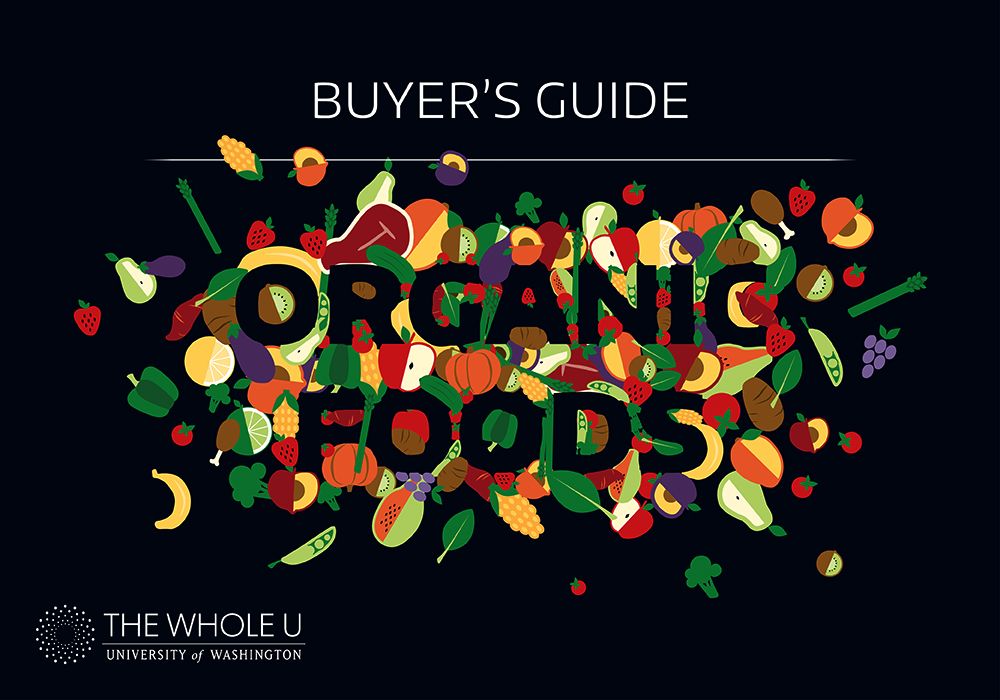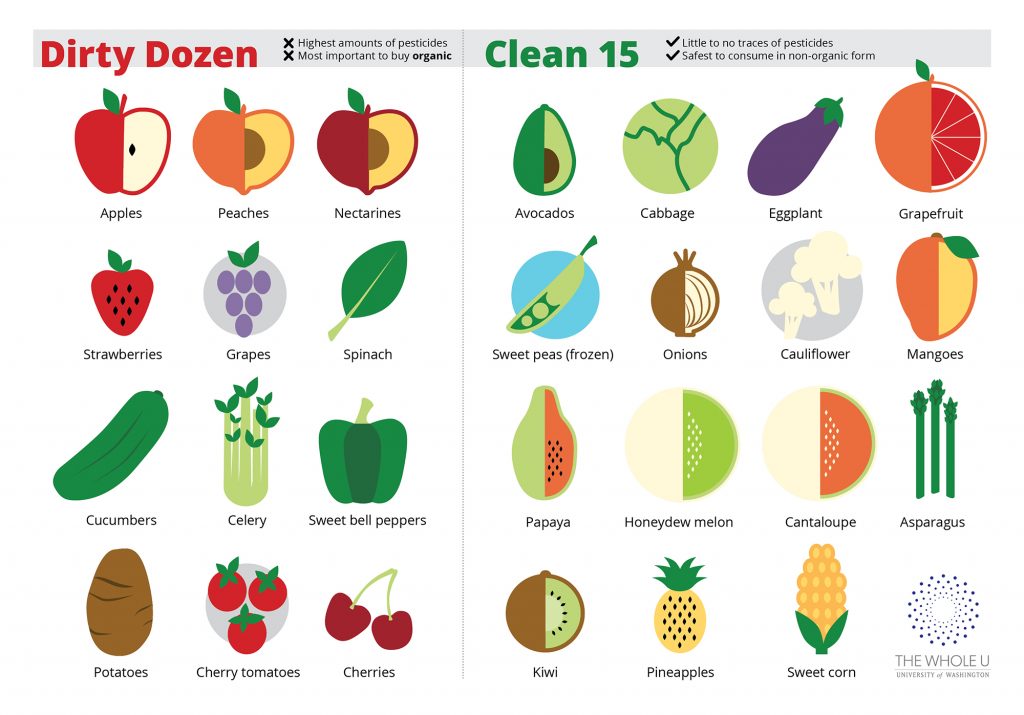
When to Buy Organic Fruits, Veggies & Meat
As a dietitian working in the cancer unit, my patients are often very interested in nutrition. The topic of organic food stirs up a lot of questions: Should they shop organic after being diagnosed with cancer? Should they transition to an all-organic diet to stay healthy and reduce the risk of relapse moving forward? Why opt for organic in the first place?
The popularity of organic foods is rising, and now almost all supermarkets have a wide variety of organic selections. Organic food categories vary: 100% organic, made with organic ingredients, etc. It can be confusing even for a dietitian. Let’s explore what the labels mean.
“100% organic” can be used to label any product that contains 100% organic ingredients (excluding salt and water, which are considered natural)
“Organic” can be used to label any product that contains a minimum of 95% organic ingredients
“Made with organic” can be used to label a product that contains at least 70% organically produced ingredients
Fruits and Vegetables
Choosing organic fruits and vegetables reduces our exposure of pesticides. Some studies have shown that organic fruits contain more antioxidant activity than conventionally grown fruits. However, there is not enough evidence to prove organic foods will reduce the risk of cancer.
There is more evidence that choosing a diet high in plant-based foods will reduce the risk of many cancers. Try to include a wide variety of fruit and vegetables in your diet, as each one of them contain specific benefits.
If you choose to buy organic fruit and vegetables, it may be financially stressful or it may not be available in your area. You might also want to invest your money best where it really makes sense to buy organic produce versus conventionally grown produce. I often advise my patients to check out ewg.org where there is a list of “The Dirty Dozen” (more pesticide residue) and “The Clean Fifteen” (least pesticide residue).

At the Plaza Café, we feature seasonal organic vegetables when possible and work closely to offer more sustainable produce on the menu.
We also have a farmer’s market every Wednesday of the month where we carry local sustainable produce — which goes a long way in helping the environment by reducing transport time and energy consumption. This also enhances the health benefits of produce by retaining flavor and vitamins, both of which are reduced by transit time.
There are also many community-supported agriculture (CSA) programs across Seattle where you can become a member and get local fruits and vegetables weekly and help to support our local farmers as well. You can visit this website below to learn more about local CSA programs.
Meat and Poultry
Various studies have shown that organic meat and poultry contain higher amounts of omega-3 fatty acids than conventionally raised meat, which helps to prevent inflammation and cardiovascular disease. For meat and poultry to be labeled “organic,” the animal or bird must have access to graze outside for a certain amount of time, which might contribute to the higher fatty acid content.
Even though organic meat has relatively higher omega-3 fatty acids, it does contain more overall fat and should be consumed in moderation. If you are interested in purchasing local organic meat and poultry, this website might be helpful.
And remember: Even when foods are organic, they still contain calories. It’s our responsibility to be mindful of the foods we allow to enter our body.

Julia Marnadi RD, CD is an inpatient dietitian for hematology oncology and bone marrow transplant population. In her spare time, she likes cooking, trying new recipes, spending time with her family and running with her friends.
7 Thoughts on “When to Buy Organic Fruits, Veggies & Meat”
On July 27, 2016 at 8:16 AM, Judith Wood said:
I think it is important to note that the Dirty Dozen and Clean 15 lists address only the health of the consumer. If you want to consider your food-buying impact on the health of the people who grow, harvest, and handle your food, then consider expanding your organic list, if it is available and you can afford it. The farm workers and their families will thank you.
On July 29, 2016 at 2:06 PM, Julia said:
Thank you Judith for the comment! That’s very true and something I will consider for sure : ) Regards, Julia
On August 4, 2016 at 11:57 AM, Tonya Skuse said:
” If you want to consider your food-buying impact on the health of the people who grow, harvest, and handle your food, then consider expanding your organic list, if it is available and you can afford it. The farm workers and their families will thank you.”
Source for that, please. I grew up on a commercial dairy farm. My degree is in agriculture (animal science). I follow a lot of commercial conventional farmers on social media. I know of no farmer who thinks living on a conventional farm or raising their kids there is hazardous or more hazardous than would be on an organic farm. Certainly there are precautions to be taken, as with any industrial job, but a blanket statement that organic farmers have better, safer lives? Source needed. There are studies that show that farm kids have stronger immune systems because of the biodiverse environments they grow up in.
On July 27, 2016 at 11:29 PM, RD said:
“Outdoor access” means very little. Between a non-organic, 100% grass-fed meat or poultry and an organic with very little access to outside, I would go with 100% grass-fed anytime.
On August 4, 2016 at 9:41 AM, Tonya Skuse said:
Can we stop promoting organic as better when there’s no evidence to support it as such? The “clean 15” & “dirty dozen” are produced by a group w/ a vested interest in the organic industry. Organic farming DOES use chemicals, pesticides, fertilizers, etc & those do leave residues on produce. In fact, the organic industry may apply products to crops at higher concentrations, more frequently (more fossil fuels used to run the sprayer & more water to mix w/ soluble chemicals), and more harmful than what’s used to grow conventional crops. Honestly, I am disappointed a RD would write this article. Organic is a marketing tool. How about a fair, balanced & evidence/science based discussion of food?
On August 4, 2016 at 9:46 AM, Tonya Skuse said:
“Various studies have shown that organic meat and poultry contain higher amounts of omega-3 fatty acids than conventionally raised meat, which helps to prevent inflammation and cardiovascular disease. ”
It’s not physically possible to consume enough red meat or poultry or milk raised to containing higher amounts of omega-3s to make the increased amount of omega-3s in those products actually have an impact. The added benefit of higher omega 3s in these products is not worth the highly inflated price. If you want to increase omega-3 intake, focus on foods actually known for their omega-3 content, like salmon.
On August 4, 2016 at 11:51 AM, Tonya Skuse said:
The so-called “dirty dozen” list has also been largely discredited by the scientific community, Dolan says. “Before using or promoting this list or covering today’s list release, we ask concerned consumers and the media to review some of the peer reviewed studies and government reports that can provide a scientific perspective about pesticide residues,” she says. These include:
-USDA Pesticide Data Program report released in December. The United States Department of Agriculture/Environmental Protection Agency/Food and Drug Administration conclusion: “residues do not pose a food safety concern.”
-Journal of Toxicology Peer reviewed paper which examined the methodology used to develop this ‘dirty dozen’ list. Among the paper’s conclusions: No established scientific procedures were followed in the development of the list and the recommended substitutions of organic for conventional forms of produce did not reduce risk.
-Journal of Epidemiology and Community Health Peer reviewed study showed that people who ate seven or more servings of produce per day reduced their risk of premature death by 42%. Consuming that many servings reduced the risk of death from cancer by 25% and heart disease by 31%.
-Journal of Food and Chemical Toxicology Peer reviewed paper which found that if Americans increased their consumption of fruits and vegetables by a single serving, over 20,000 cancer cases could be prevented annually. This study was conducted assuming all servings were of conventionally grown fruits and vegetables.
For consumers who may still be concerned about pesticide residues, they should simply wash their fruits and vegetables. According to the U.S. Food and Drug Administration, you can reduce and often eliminate residues if they are present at all on fresh fruits and vegetables simply by washing.
http://safefruitsandveggies.com/press-releases/you-can-ignore-dirty-dozen-list-list-authors-say-conventionally-grown-produce-are
Comments are closed.